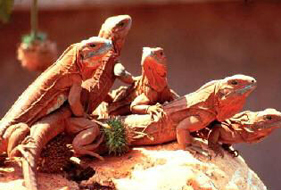Jamaica’s goat island reptile sanctuary under threat of sale to dodgy conglomerate

Jamaican government prepares to sell Goat Islands to China Harbour for megafreighter seaport
The Jamaican government is preparing to sell the Goat Islands to the China Harbour Engineering Co. to build a megafreighter seaport and industrial park. China Harbour is part of a conglomerate blacklisted by the World Bank under its Fraud and Corruption Sanctioning Policy.
Kenroy Williams, also known as "Booms," is "Guardian of the Reptiles" in Hellshire, located near the Goat Islands in Jamaica. The region is centered in the Portland Bight Protected Area, an area of ocean and land set apart in 1999 to protect its rich biodiversity of birds, reptiles, plants, trees and marine life.
"They’re destroying what should be preserved," says Booms, who has been working to protect exceedingly rare reptiles in the area for seven years, including the critically endangered Jamaican iguana. MORE INFO HERE
The specifics of the development are being withheld, but Jamaica Information Service reports it involves dredging and land reclamation, and a coal-fired power plant built to service the facilities. Environmentalists expect the mangrove forest on the two Goat Islands to be clear cut and the surrounding coral reef dredged.
With the threat to Goat Islands looming, Robin Moore, a fellow with the International League of Conservation Photographers, flew to Jamaica to record images of wildlife and people who may soon see the destruction of their beaches, mangrove forest ecosystems and their livelihoods.
In a short film by Moore, Booms talks about what’s at stake: "Portland Bight Protected Area consists of a beautiful beach and things that are here in Jamaica and found nowhere else, like the iguanas …
"When the mangroves are destroyed, the earth won’t stay together and then the water will take over. And that’s the problem. And we won’t have any beaches, and we can’t do without beaches. If we have no beaches, we have no turtles. We won’t have any crocodiles …"
Booms especially fears for the Jamaican iguanas, Cyclura collei, thought to be extinct until 1990, when Edwin Duffus found one while hunting pigs in the Hellshire Hills. The Goat Islands are right off the Hellshire coast. At the time, surveys of the area revealed fewer than 100 iguanas remaining.
Hope Zoo and Botanical Gardens in Kingston, teamed with the Fort Worth Zoo in Texas and others, set up a program to rear baby iguanas until they’re big enough to be safe from predators. After release, the iguanas are tracked and observed to see how well they fare.
The number of nesting females has grown from just six in 1991 to more than 30 in 2013. About 255 head-started iguanas have been released into Hellshire, the only place on earth — other than the Goat Islands — that they can survive. The Jamaica Iguana Recovery Project believes the islands are the sanctuary necessary to save the animal.
During the past 24 years, millions of dollars, plus the sweat of countless biologists and research volunteers, have been invested in bringing Cyclura collei back from the brink. Although many released iguanas are breeding and nesting in the wild, the animal is still critically endangered.
There is still time to help the Jamaican people save their national treasure.
Full story by Wendy Townsend at CNN HERE
Valere Tjolle
@ValereTjolle [email protected]
 United Kingdom
United Kingdom United States
United States Asia Pacific
Asia Pacific












































Dozens fall ill in P&O Cruises ship outbreak
Boy falls to death on cruise ship
Turkish Airlines flight in emergency landing after pilot dies
Unexpected wave rocks cruise ship
Woman dies after going overboard in English Channel